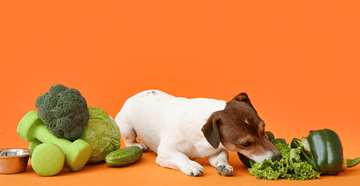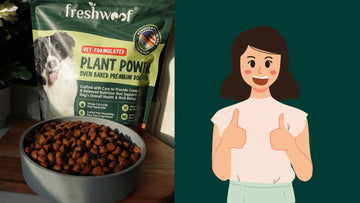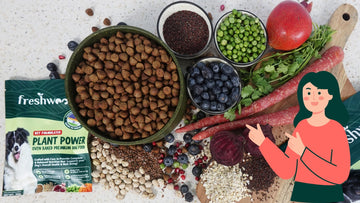Yep, you read it right! New research has just confirmed what we have been barking about for a long time. Now in what the authors believe is the first large-scale study comparing vegan with meaty dog diets, the results suggest a nutritionally sound vegan diet could bring health benefits and fewer hazards to human’s best friend.
The study, led by Professor Andrew Knight of the University of Winchester and published in the reputable journal PLOS ONE, surveyed dog parents of more than 2,536 dogs. Exploring links between dog diet and health outcomes, it found that nutritionally sound (i.e., labeled ‘complete’) vegan diets are healthier and less hazardous than conventional or raw meat-based diets.
The dogs were fed either a conventional meat diet, a raw meat diet, or a vegan diet. The survey included questions about the dogs’ health, including how many times they visited the vet, what medication they were on, and other specific dog health issues. This peer-reviewed analysis finds vegan dogs visit the vet less often and require fewer medications.
“Our study is by far the largest study published to date,” said Prof Andrew Knight, at the University of Winchester, UK, and who led the study. “It revealed that the healthiest and least hazardous dietary choices for dogs are nutritionally sound vegan diets.”
“The raw meat diet appeared to have marginally better health outcomes,” he said. “But those dogs were significantly younger, which gives them a health advantage. A substantial body of prior studies has also shown that raw meat diets are much more contaminated with pathogenic bacteria and parasites. There’s a considerable body of study showing they are associated with bacterial and parasitic pathogens and protozoa [ single-celled organisms], which are more prevalent in the dogs and also the people in the same household, so they’re getting them either from the dog or the food they’re preparing,” he said. Obviously, a young pup is going to seem healthier than an older dog! Secondly, dogs on raw meat diets were less likely to be taken to a veterinarian. While this could be a sign of better health, prior research suggests that dog parents on raw meat diets are less likely to seek veterinary advice, probably because they know that vets do not support raw diets.
According to the FDA, Center for Disease Control (CDC), American Veterinary Medical Association, British Small Animal Veterinary Association, Canadian Veterinary Medical Association, World Small Animal Veterinary Association, and a host of other organizations, raw meat pet food is the diet most likely to introduce disease-causing bacteria into our pets and our homes.
Don’t take our word for it. You can read in the links given below –
- On concerns around feeding raw meat diets to dogs in Journal of the American Veterinary Medical Association (2001)
- The nasties in raw meat-based diets for cats and dogs in Veterinary Record (2018)
- Risks to the wider household when feeding raw meat diets to dogs are reviewed in One Health journal (2021)
- Parasite risks from raw meat-based diets for pets in Companion Animal (2020)
- Bacterial contamination in raw pet food (Lefebvre S. L., et al. “Evaluation of the Risks of Shedding Salmonellae and Other Potential Pathogens by Therapy Dogs Fed Raw Diets in Ontario and Alberta.” Zoonoses Public Health),
Among the findings were that 17% of dogs on conventional diets had four or more visits to the vet over the course of a year, compared with 9% for those on vegan diets and 8% for those on raw meat diets. The percentage of dogs reported to have suffered from health disorders was 49% for the conventional diet, 43% for the raw meat diet, and 36% for the vegan diet.
Survey-based studies cannot reveal the reasons for their results but Knight suggested weight problems might be an important factor: “One of the most common health problems for dogs is being overweight or obese and it is unfortunately common that when we do tests on the commercial meat-based diets, there are more calories. We also know the health hazards associated with overconsumption of meat and dairy for people and it’s often the same ingredients,” he said, although in some countries pet food can contain meat deemed not fit for human consumption.
Of course, if you’ve been feeding Freshwoof or a vegan diet designed by a nutritionist, this probably isn’t news to you! Those of us with pups living life on the veg can already see how much healthier and happier they are on a meat-free diet. But if you're worried about the novelty of vegan dog food, this study shows that a plant-based diet is not just safe, but potentially safer for your dog than a regular meat-based diet.





